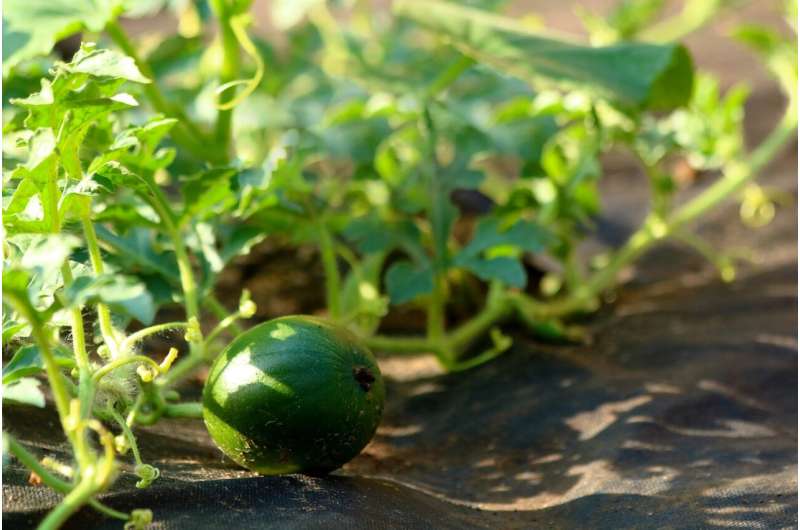Researchers identify up to 98 potential species of melon, watermelon and almond pollinating bees

Researchers from the Faculty of Biological Sciences of the University of Valencia (UV), with other Spanish and European universities, have identified a total of 98 species of bees potentially pollinating three crops of economic importance in Spain: melon, watermelon and almond. The research, published in the journal Annales de la Société entomologique de France, will help plan conservation actions for the pollinating diversity of these crops.
The pollinating species of most of the crops in the European Mediterranean regions are still unknown. In this study, whose first signatory is Sara Rodrigo, a researcher at the University of Castilla-La Mancha and in which the Complutense University of Madrid and the National Museum of Natural Sciences also participate, 98 species of bees were identified (Hymenoptera: Apoidea) associated with melon (Cucumis melo), watermelon (Citrullus lanatus) and almond (Prunus dulcis) crops. This fact shows that, in addition to honeybees, local pollinators can be important in the pollination of crops.
This process is important given the high dependence of the honeybee to maintain the pollination of crops, although the activity of these insects is limited by the use of pesticides and, in addition, their density compromises the service of the wild bee species.
Doing research on the different types of bees that visit crop flowers is an essential requirement to maintain a pollination service for these and to implement integrated crop pollination, a new concept that aims to make controlled use of wild pollinators.
"Both melon, watermelon and almonds have pollen that is not carried by the wind, for which they depend to a great extent on pollinators for their reproduction. Therefore, the results of these studies will help in the planning of conservation actions to preserve the pollinating diversity in the Spanish areas that have these crops, which are of great economic importance in Spain," highlight Jesús Selfa and Miguel Guara, professors of the Department of Zoology and the Department of Botany and Geology, respectively, of the University of Valencia.
The results of this work are part of a project started in 2013 as a result of the development of Sara Rodrigo's Final Master's Thesis presented in December 2012 at the UV, and which was co-directed by Selfa and Guara, and by Carlo Polidori, currently researcher at the University of Milan.
Within the results of this first investigation, a pioneering article was published in 2016 in the journal Entomological Science, where the pollinating entomofauna in melon crops in the Mediterranean environment was analyzed. This article already indicated that all bees did not seem to be affected in the same way and it could be thought that the less vulnerable species could supplant the other species in the pollinating function, which would probably work only in some cases. "It was wrong to think that if some species disappeared, there would likely be others, without taking into account the interrelationships that existed between them and with respect to the environment where they lived," the authors point out.
More information: Sara Rodrigo Gómez et al. Small sweat bees (Hymenoptera: Halictidae) as potential major pollinators of melon (Cucumis melo) in the Mediterranean, Entomological Science (2016). DOI: 10.1111/ens.12168
Sara Rodrigo Gómez et al. Bees and crops in Spain: an update for melon, watermelon and almond, Annales de la Société entomologique de France (N.S.) (2021). DOI: 10.1080/00379271.2020.1847191
Provided by Asociacion RUVID


















